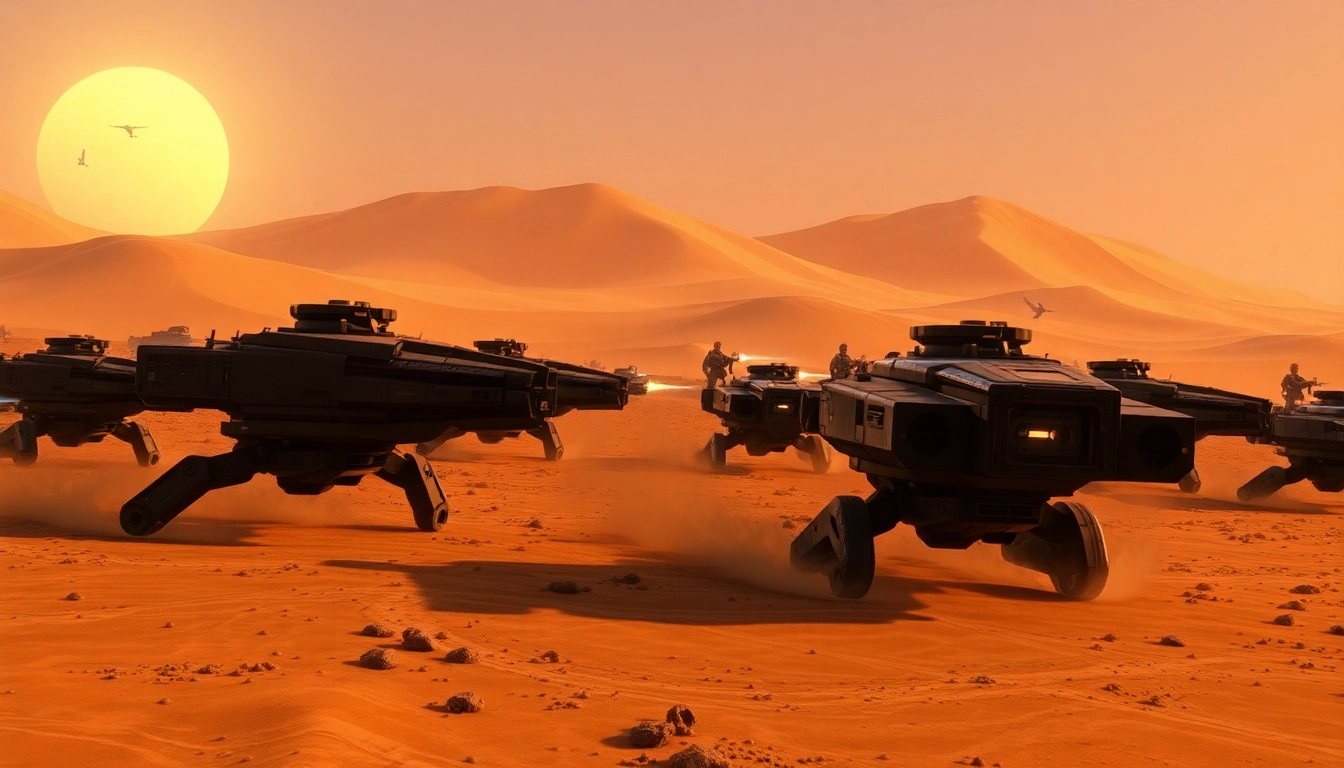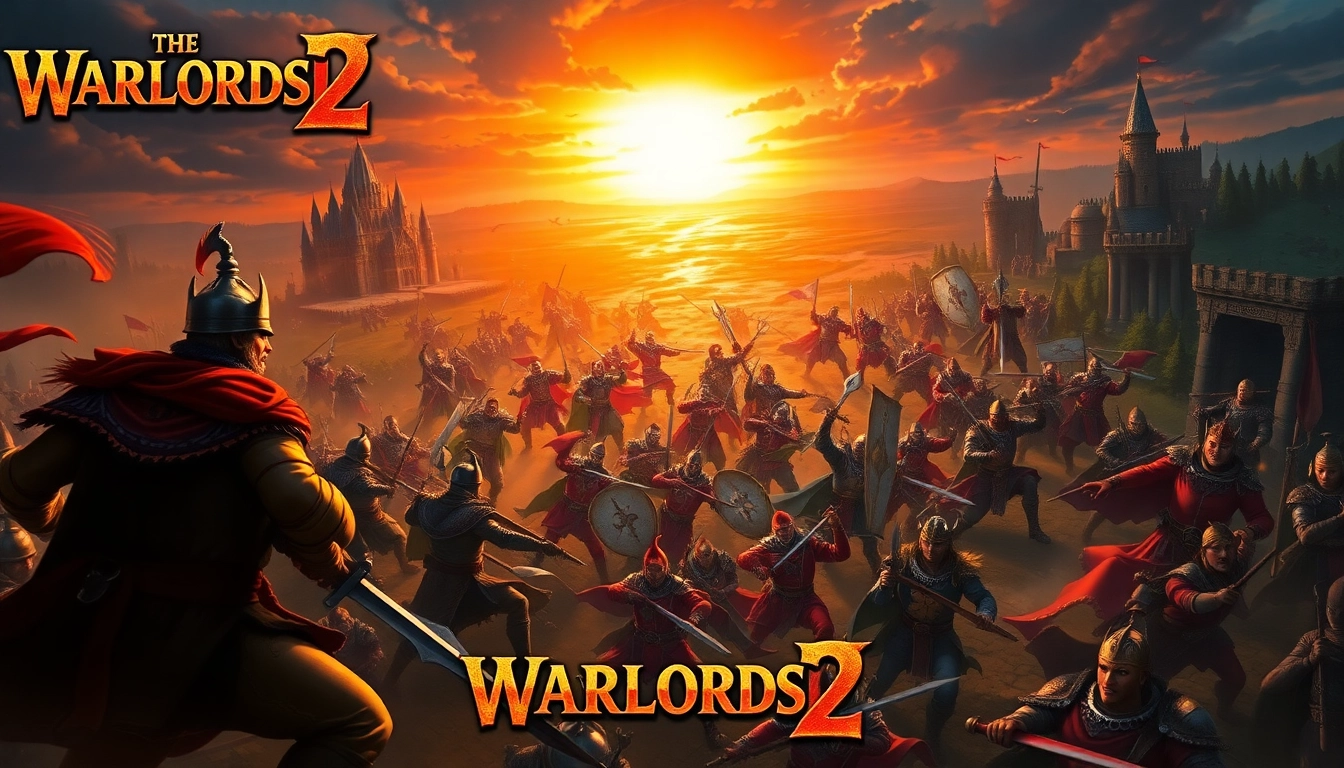Understanding the Dune 2 Game Mechanics
Gameplay Basics and Objectives
The dune 2 game stands as a pioneering title in the real-time strategy (RTS) genre. Players are cast into a universe inspired by Frank Herbert’s Dune saga, where factions vie for control over the desert planet of Arrakis, known for its precious resource: spice. Each game unfolds in a battle for supremacy, and players must choose between three distinct houses—Atreides, Harkonnen, or Ordos—each offering unique units and capabilities. The primary objective is to destroy the enemy base while protecting your own. Players must engage in strategic planning and real-time decision-making to achieve victory, making every mission a test of intellect and reflexes.
Resource Management Tips
Resource management is critical in Dune 2, primarily revolving around spice collection. Players must strategically place harvesters to efficiently gather spice while safeguarding them from enemy raids and sandworms, which can obliterate them. Here are some practical tips:
- Scout Early: Send units to scout spice fields immediately, identifying the best locations before your opponents.
- Balance Economy and Defense: While it’s important to expand your spice operations, ensuring you have a robust defensive strategy is equally vital.
- Upgrade Harvesters: Invest in upgrades for your harvesters to increase their efficiency, allowing for quicker spice collection.
Key Features of Dune 2
Dune 2 is lauded for its innovative gameplay mechanics that set the stage for future RTS games. Key features include:
- Three Unique Factions: Each faction has specialized units, offering varied play styles and strategies.
- Dynamic Terrain: The environment can affect gameplay; players must adapt their strategies based on terrain advantages and challenges.
- Real-Time Battles: Players must make swift decisions in an ever-changing battlefield, leveraging each unit’s strengths and weaknesses.
Strategies for Winning in Dune 2
Effective Unit Deployment
In Dune 2, the way players deploy their units can make or break their strategy. Understanding the strengths, weaknesses, and abilities of each unit is crucial. For example, infantry units are often best used for capturing bases or scouting, while vehicles excel in direct confrontations. Here are strategic tips for unit deployment:
- Layered Defense: Use infantry to provide a buffer for more powerful units like tanks; this tactic minimizes casualties while maximizing firepower.
- Flanking Maneuvers: Utilize faster units to flank enemy positions, catching them off guard and disrupting their strategy.
- Build Mixed Armies: Incorporating a variety of unit types can create a more balanced army capable of handling diverse threats.
Building a Strong Economy
A robust economy is essential for maintaining a competitive edge in Dune 2. Players should focus on maximizing resource production while simultaneously investing in technological advancements and military units. To build a strong economy, consider the following:
- Prioritize Spice Fields: Focus your army on controlling key spice fields to starve opponents of resources.
- Expand Wisely: Avoid overextending; instead, methodically secure resources while developing a defensive front.
- R&D Investments: Don’t overlook technology upgrades for your units; these can turn the tide of battle by making your forces more effective.
Countering Opponent Tactics
In Dune 2, understanding and countering opponent strategies is key to maintaining dominance. Players should observe their opponents’ movements and adapt accordingly. Here’s how you can counter common tactics:
- Identify Weaknesses: If your opponent builds heavily on one type of unit, deploy their counter. For instance, anti-tank units can be effective against armored assaults.
- Feign Retreat: Sometimes, retreating can draw the enemy into a vulnerable position; then, counterattack with hidden reserves.
- Disruption Tactics: Use fast units to disrupt enemy supply lines, slowing down their ability to reinforce and maintain pressure.
The Importance of Map Awareness
Understanding Terrain Advantages
Terrain plays a significant role in Dune 2, influencing movement and strategic positioning. Players must leverage high ground, chokepoints, and natural barriers to their advantage. Key considerations include:
- High Ground Advantages: Units stationed on higher elevations gain a significant range advantage, allowing them to target enemies before they can retaliate.
- Chokepoints: Control narrow passages to funnel enemy movements; this is ideal for ambush tactics.
- Sandworm Risk: Remember that certain areas are more prone to sandworm attacks; avoid sending harvesters into these zones and alert units to protect your operations.
Utilizing Strategic Locations
Strategic locations on the map can provide significant bonuses, so players must prioritize their capture. This includes not only spice fields but also bases and resource deployment centers. Here’s how to effectively utilize strategic locations:
- Base Capturing: Early unit rushing to capture enemy bases can provide a logistical advantage and increased unit production capabilities.
- Spice Control: Focus on controlling spice fields closest to the enemy to deplete their resources while enhancing yours.
- Establish Forward Positions: Use outposts to create a forward base for staging assaults or gathering intelligence on enemy movements.
Anticipating Opponent Moves
Success in Dune 2 also hinges on the ability to predict rival strategies. By closely monitoring their troop movements and building developments, players can plan their actions in advance:
- Scout Regularly: Having units dedicated to scouting will keep you informed on opponent positions and tactics.
- Watch for Patterns: As you engage with an opponent, look for patterns in their build orders and unit deployments, adjusting your strategy to exploit their habits.
- Adapt and Improvise: Stay flexible; if a tactic isn’t working, be ready to pivot to alternative strategies that leverage your strengths against their weaknesses.
Advanced Techniques for Experienced Players
Mastering Tech Upgrades
In Dune 2, technological prowess can often dictate the outcome of battles. Players should prioritize tech upgrades that enhance unit capabilities, improve harvesters, and unlock powerful new units. Here are some techniques for mastering tech upgrades:
- Prioritize Military Upgrades: Focus on unlocking upgrades that enhance your offensive capabilities first, ensuring that you can hold off initial enemy attacks.
- Monitor Enemy Tech: Scout to determine what technologies your opponents are developing; prepare counters in advance.
- Invest Wisely: Balance tech upgrades with unit production; funneling too much into technology could leave you vulnerable in early battles.
Using Alliances to Your Advantage
While Dune 2 primarily focuses on direct conflict, forming temporary alliances with other players can be strategically advantageous. These alliances can allow for the sharing of resources and coordinated attacks:
- Cooperative Raids: Plan joint assaults to take down a common enemy, ensuring both parties benefit from the spoils.
- Resource Sharing: In positions of mutual benefit, players can trade resources to accelerate economic growth.
- Distracting Opponents: Use your alliance status to distract opponents while you build your own forces in safety.
Incorporating AI Behaviors in Strategy
Emulating successful AI behaviors can refine your strategic planning. Understanding how AI units behave in various scenarios can yield insights for human opponents:
- Predictive Tactics: Study how AI makes decisions in high-pressure situations to inform your own decision-making processes.
- Misdirection Techniques: Use units to bait AI into traps; this can pivot responses to face unexpected tactics.
- Anticipatory Moves: By observing AI unit formations, players can learn the best ways to deploy their strategies against different unit types.
The Legacy of Dune 2 Game and Its Impact
Historical Significance in Gaming
Dune 2 is widely regarded as the father of the RTS genre, laying foundational concepts that would influence countless games in the years following its release. Its emphasis on real-time resource management and unit control reshaped how strategy games are designed and played. The systems it introduced, such as resource gathering and building placement, can be seen in modern giants like StarCraft and Age of Empires.
Sequel and Franchise Development
The success of Dune 2 led to several sequels and spin-offs, each building upon its predecessor’s mechanics while exploring the rich lore of the Dune universe. Titles like Dune 2000 and Emperor: Battle for Dune further fleshed out the gameplay and narrative, introducing new factions, units, and strategies. The ongoing interest in the Dune series highlights the enduring legacy of Dune 2 and its influence within the gaming community.
Lessons Learned from Dune 2
Players can derive valuable lessons from Dune 2 that extend beyond gaming strategy. These include:
- Resource Management Skills: The importance of managing resources in Dune 2 can be applied to various aspects of life, such as budgeting and project management.
- Adaptability to Change: The necessity of adapting strategies to dynamic situations is a critical skill for success in both gaming and real-world scenarios.
- Strategic Planning: Crafting long-term strategies while remaining flexible in execution can prepare individuals for challenges in any field.


